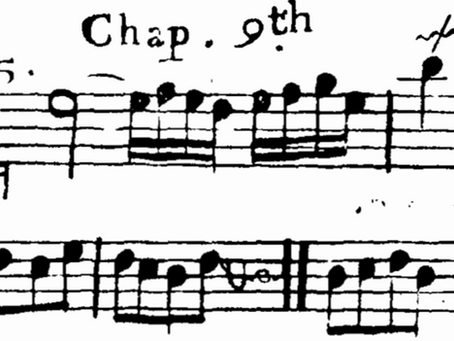top of page
Reimagining Historical Voices
Search


Adriano Banchieri’s ‘Hundred Passaggi’:
‘The hundred passaggi above, all having been printed in various works by modern authors, have been assembled with much study and...

Tim Braithwaite


Pietro Reggio on the Sliding ‘Accent’ (1677)
‘Now let us take notice, of singing long Notes Gracefully. Note the following Example. The first Note must begin softly, and then...

Tim Braithwaite


Lamperti on the Decadence of Singing Immediately Before the Advent of Commercial Recordings
‘It is a sad, but nevertheless undeniable truth, that the art of singing is in a terrible state of decadence; and this fact is all the...

Tim Braithwaite


Giovanni Bononcini on reading in all keys and clefs using a six note solmisation system (1678)
*Notes* - The system (c.1500-1800) is based on three overlapping ’hexachords’ of six syllables - do re mi fa sol la. - In order to change...

Tim Braithwaite


Gilbert Austin on the Acting of Opera Singers (1806):
‘...The union of all those talents, which we have mentioned, and their bearing thus upon a single point condensed into a focus, is a...

Tim Braithwaite


Francesco Lamperti on the Open and Closed Timbres
‘ARTICLE V. OF THE QUALITIES OF THE VOICE. Q. How many different qualities are there in the voice ? A. The principal are two, the open...

Tim Braithwaite


Domenico Corri on Larynx Height Rising and Falling with Pitch:
‘You may observe, that the different tones of the voice are produced by the different positions which the larynx assumes in its rising...

Tim Braithwaite


Manuel Garcia on how to Express the Different ‘Shades of Passion’
‘A few trials will suffice to prove that every shade of passion, however slight, will effect in a peculiar way the physical condition,...

Tim Braithwaite


Charles Burney on the Students at the Conservatorio of S. Onofrio: Wednesday 31st October 1770
This morning I went with young Oliver to his conservatorio of S. Onofrio, and visited all the rooms, where the boys practice, sleep and...

Tim Braithwaite


A Comparison Between Cathedral Singing and the Singing of David’s Psalms (1644)
Davids Psalms sung in our English Meeter differ much from Cathedrall singing, which is so abominable, in which is sung almost every...

Tim Braithwaite


Giovanni Bardi on the Ancient and Modern Methods of Singing Different Modes (c.1578)
‘It should be noted that the [ancient] tonoi were not sung as we do [ours], that is, the bass [singer] intones re or ut or some other...

Tim Braithwaite


Thomas Morley Describing a Hypothetical Competition in Improvised Singing (1597)
‘When I learned descant [1] from my master Bold he, seeing me so inclined and willing to learn, always had me in his company, and because...

Tim Braithwaite


Reminiscences of a Cacophonous (!) way of ‘Singing on the Book’ in Early 19th-Century France
‘I know of no musician today who has any idea what it means to sing on the book. It was an improvised and simultaneous melody [chant]...

Tim Braithwaite


Summary of the Rules of Singing on the Book: Those of “strict counterpoint” in two voices
The summary below is from Jean-Paul Montagnier, “Le Chant Sur Le Livre Au XVIIIe Siècle: Les Traités de Louis-Joseph Marchand et Henry...

Tim Braithwaite


Improvising on a Plainchant (Chanter sur le Livre) as described in Early Nineteenth-Century France
‘... France, where musical taste has always been somewhat backwards, has never abandoned the mania for improvising on plainchant. The...

Tim Braithwaite


Friedrich Weber on Choral and Solo Singing and Training the Choral Voice (1800)
‘Singing exercises that last too long and involve too much effort make the voice screeching, cause the voice to go out of tune, and are...

Tim Braithwaite


Tosi on the Excesses of Modern (1723) Singers, and the Patience of the Waiting Orchestra
Ԥ 5. Every Air has (at least) three Cadences, that are all three final. Generally speaking, the Study of the Singers of the present...

Tim Braithwaite


Johann Hiller on improving the text setting of even ‘the best composers.’ (1780)
‘When several notes are sung to one syllable, the performance is called melismatic singing. Thus, every long or short extension of a...

Tim Braithwaite


Do Tosi and his commentators prefer too many or too few ornaments?
I was recently flicking through an instruction book aimed at teaching modern singers how to ornament eighteenth-century repertoire, and I...

Tim Braithwaite


Johann Friedrich Agricola (1757) and Wolfgang Caspar Printz (1678) on Choral Singing
‘The loudness or softness, especially on long and serious notes, must be observed even by those who sing the supporting voices [not the...

Tim Braithwaite
bottom of page
